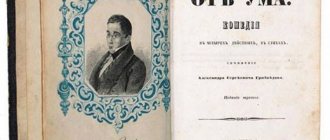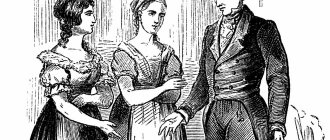Words
When Sofia first learns about the arrival of her old friend, she says the following words: “He knows how to make everyone laugh; // He chats, jokes, it’s funny to me; // You can share laughter with everyone.”
During a conversation with Chatsky, who expressed his opinion regarding Sophia’s beloved Molchalin, the girl said a phrase to the side that demonstrates Sophia’s true attitude towards Chatsky: “Not a man, a snake!”
During the course of the story, the conflict and misunderstanding between the characters increases, Sophia utters the following words: “I don’t have the strength to look at you, I don’t have the strength to listen to you.” The heroine claims that Chatsky is indifferent to other people's misfortune and happiness. In a conversation with Molchalin, Famusov’s daughter exclaims: “Why did God bring Chatsky here!” When the central character asks Sophia why he is not worthy of her love, the heroine answers him that he is ready to “pour bile on everyone.”
Literary Magazine
Many modern researchers, in understanding the “final content” of Griboyedov’s comedy, remain within the boundaries of the semantic field that was defined by I. Goncharov in his article “A Million Torments.” But if the great philologist-thinker of the 20th century M. Bakhtin is right in his statement that “classical works of art break the boundaries of their time”, that “in the process of their subsequent life they are enriched with new meanings, new meanings”, then what new facets and meanings in Are comedies opening up to the modern reader today in meaningful images? How do we today understand the main characters of “Woe from Wit” - Chatsky and Sophia? What is their relationship with the Famus society in which they grew up? Let's try to read Griboedov's play differently from how L.S. recently read it. Yzerman (see “Literature”, No. 1, 1995), not on a specific historical level as “the most serious political work of Russian literature of the 19th century” (V. Klyuchevsky), but on a universal human level - as a drama of a talented person whose “mind I’m not in harmony with my heart.” It is very important to see when and how, in what elements of the structure of the whole, an artistic idea is born at the beginning of the play and how it further develops in its subsequent links. For the first time, the reader learns about Chatsky from the words of Liza, who compares him with Skalozub: Yes, sir, so to speak, he is eloquent, but painfully not cunning: But be a military man, be a civilian. Who is so sensitive, and cheerful, and sharp. Like Alexander Andreich Chatsky. Let us pay attention to the rhyme “not cunning - sharp.” “In comedy in verse,” rhyme is one of the most important forms of expressing the author’s position. At first glance, Chatsky and Skalozub are opposed to each other in Lisa’s statements, but the rhyme equalizes them. Chatsky and Skalozub are equal not only for Sophia, as possible suitors rejected by her, but also in a certain sense for the author. It is still difficult to understand this meaning, but through rhyme the author influences the reader’s subconscious, his emotional attitude towards the hero. Already the first remark about Chatsky evokes in the attentive reader, sensitive to the word, an as yet unconscious, ambivalent attitude towards the hero. It can be assumed that this is the author’s attitude, since it is the author, creating the text, choosing words and rhymes, who conveys to the reader and infects him with his attitude. On one level - external, ideological - Chatsky and Skalozub are opposed to each other, on another - deep - they are equal. The author’s voice in a “comedy in verse,” unlike a “novel in verse,” does not sound separately and independently. It is distinguishable (except for stage directions) only in the voices of different characters. We simply will not see much or will misunderstand in Griboedov’s play if we do not constantly take into account the dialogic nature of the artistic word (the presence of at least two voices) and not the subjective-monological, but the objective-dialogical position of the author. Now let's see how the main character first appears on stage. And again the rhyme will be in the center of our attention: Lisa. Forgive me, really, as God is holy, I wanted this stupid laughter to help cheer you up a little. Servant. Alexander Andreich Chatsky is here to see you. This unexpected purely comedic rhyme “stupid - Chatsky” inevitably affects the reader’s subconscious, evoking certain feelings and emotions (smile, good laughter, irony?). And the very first words of the smart Chatsky carry a hint of the comic: As soon as it’s light, you’re already on your feet! and I am at your feet. (He kisses his hand passionately.) What is revealed in these words: self-irony or the author’s ironic attitude towards his hero? Is Chatsky able to look at himself from the outside and laugh at himself? Does he himself notice how comical, for example, his words sound when he talks about his passionate love for Sophia: “Tell me to the fire: I’ll go as if for dinner”? This could be said by Skalozub or Famusov, for whom “love” and “dinner” are words of the same kind. If our feelings caused by the influence of rhyme are true, then comedy (“stupid - Chatsky”) is embedded in the structure of character, in its core. And at the same time, the neighboring verse - “Forgive me, truly, how holy God is” - evokes a semantic association with the lofty, ideal, which, undoubtedly, is in Chatsky. Lisa’s prosaic word (“how holy God is”), falling into a poetic context, is filled with new associative meanings and meanings. It is also very important to note that in the text of the play, between the two marked comedic rhymes, there are words from Lisa, which undoubtedly express the author’s attitude towards the hero: And that’s all? as if? ~ Shedding tears, I remember, poor man, how he parted with you. ..... The poor thing seemed to know that in three years... Thus, through rhyme and Lisa’s “voice”, the author shows his attitude towards Chatsky and infects the reader with his feelings. Laughing at others (as we see later in the play), but also funny himself and at the same time deeply and sincerely suffering, Chatsky evokes an ironic attitude towards himself and natural pity and compassion. The complexity and non-obviousness for many readers of this ambivalent attitude of the author towards his hero is explained by the fact that pity is expressed in open text, in the words of Lisa, which inspires confidence among readers, and irony is “only” through rhyme. The remark “fervently kisses the hand” and the next twelve verses of Chatsky’s first statement reveal significant features in the character of the hero: not only the passion of his nature, but also high demands on others (almost demanding love for himself) with a complete absence of feelings of his own guilt. He left his beloved for three years without reasons that were important, in her opinion, and did not even write, and suddenly a passionate feeling for forty-five hours and a demand for immediate reward for his “exploits.” Let us note one more feature of Chatsky: the ability to immediately, instantly (the property of an intelligent person), feel, see, understand the main thing (“Not a hair of love”) and then throughout the entire play to deceive oneself, not to believe the obvious (Sophia’s sincere words about Molchalin: “ That’s why I love him”) and condemn Sophia for an imaginary deception (“Why did they lure me with hope? Why didn’t they tell me directly...”). The hero, who so often laughs at others, so wittily ridicules the shortcomings and vices of others, turns out to be completely unable to feel an ironic attitude towards himself, to hear an obvious mockery of himself in Sophia’s words: Whoever flashes by will open the door With a question, I, even if I were a sailor: I haven’t met Is there somewhere in the postal carriage for you? In Chatsky’s next monologue, the “persecution of Moscow” begins, in which we see more evil irony and “abuse” than good-natured and cheerful wit. Sophia perceives his ridicule, attacks on “father”, “uncle” and “auntie”, on all his relatives (“Living with them will get boring, and in whom will you not find stains?”), Sophia perceives them as social gossip: I wish I could set you up with my auntie. To count everyone you know. And here, naturally, a question arises, which is usually not posed by researchers due to the imaginary obviousness of the answer: is Chatsky speaking the truth and truth about Moscow, about noble society, or is this “gossip” and slander against the fatherland? What is unique, what is special about this view of Moscow? Is this also the author's view? Is G. Vinokur right in his statement: “...most of Chatsky’s monologues are lyrical monologues, that is, Chatsky speaks in them mainly on behalf of the author”? In the comedy “Woe from Wit” two main points of view, two views are distinguishable: we look at Chatsky through the eyes of the author, at Famus society through the eyes of Chatsky. That’s why we see predominantly Famusov’s Moscow, that is, “spots,” vices and shortcomings, and we do not see that Griboyedov’s Moscow, which M. Gershenzon and N. Antsiferov wrote about, which was depicted in the novel “War and Peace” by L. Tolstoy. But “bright Moscow” (P. Vyazemsky), reflecting the spiritual beginning and life of the soul of noble society, can be seen in the images of Sophia and Chatsky. Moreover, in Chatsky the type of noble revolutionary, future Decembrist is expressed, which Yu. Lo convincingly showed, and behind Sophia one can discern another part of advanced society that did not accept the path of the revolutionary reorganization of Russia. Chatsky’s view of Moscow is, perhaps, the view of Griboyedov himself, but in his youth, in his youth, in a previous era of his life. This is the view of an idealist and romantic, a person who passionately desires to realize his dreams, his ideal in life; this is the view of a maximalist who does not want to compromise, who does not forgive anyone for shortcomings and vices; and at the same time, this is the view of a person who has an almost Gogolian gift of seeing in every person, first of all, his funny, comic side; This is an unfortunate gift - to see mainly evil, vices and sins in other people, this is “spiritual crippling, spiritual dislocation” (N. Berdyaev). But if in Gogol we feel the deepest compassion and great pity for man, the artist’s grief for man, then Chatsky “stings” everyone without the slightest pity. “Not a man, a snake!” - says Sophia when it’s time to mock Molchalin. Sophia's attitude towards Chatsky changed dramatically over three years, and there were several reasons for this. First of all, let us note the woman’s strong and deep resentment: he became bored with her, first he went to see friends, and then he left completely. Chatsky’s very passionate feeling (“kisses his hand with fervor”) evokes doubt, coldness, and even hostility in Sophia. It can quickly pass and burn out. It makes Chatsky too talkative, impudent, and unceremonious. Sophia has a different temperament: more calm, contemplative - and in love she is looking not for “wind, storm”, which threaten “falls”, but for inner peace, spiritual harmony (“Neither worry, nor doubt...”). Chatsky was not only “completely at a loss” on the road, but also at a loss within himself (“mind and heart are not in harmony”). And in Sophia lives that pure and poetic feeling of falling in love with Molchalin, when “the shyness and timidity of the beloved is so natural and pleasant, when a simple touch on the hand is enough, when the night passes so quickly and imperceptibly while playing the “piano and flute.” Sophia herself has changed over these three years, her attitude towards people and the world has changed. The age of cute fun, funny jokes, carefree laughter has passed; The time has passed when she liked to laugh with Chatsky at others, at loved ones, and the old laughter, apparently, was cheerful, and not evil. Finally, she saw and understood in Chatsky his main vices - pride (“He thought highly of himself...”) and lack of kindness towards people: I want to ask you: Has it ever happened that you laughed? or sad? A mistake? did they say good things about anyone? Now let's return to the fourth scene of the first act, to Sophia's story about her dream, which, according to the unanimous opinion of modern researchers, was invented in order to deceive her father. Usually they see the prophetic meaning of a dream, discovering its connection with the final scene of the play: “Knock! noise! Oh! My God! The whole house is running here!” Let's try to read this dream differently. The happy state of the heroine at the beginning of the dream (“sweet man”, “flowery meadow”, “meadows and skies”) is contrasted with a “dark room” and a threat from others in the second half of the dream: Then the doors opened with thunder Some people and not animals. We were separated - and they tortured the one sitting with me. It’s like he’s dearer to me than all the treasures. I want to go to him - you drag him with you: A groan and a roar see us off. laughter, whistling of monsters. From whom does the real danger come, what does Sophia’s intuitive, subconscious premonition indicate? The further text of the play shows us an undoubted, deep connection with Chatsky. Molchalin is “more precious than all treasures” for Sophia, and Chatsky, to whom she will later say: Killed by their coldness! I don’t have the strength to look at you, I don’t have the strength to listen to you, - about the danger of which Liza warns (“Look, Chatsky will make you laugh”), such Chatsky (“Not a man, a snake!” - “some kind of not people and not animals” ) for Sophia is like a “monster”| and poisonous attacks on Molchalin will sound to Sophia like “roar, laughter, whistle.” And then Sofia’s words to Famusov (“Ah, father, sleep in your hand”) acquire a second meaning, and not only express the desire of the resourceful daughter to put her suspicious father on the wrong trail. In the second act of the play, we will highlight only one semantic line, we will pay attention not to Chatsky’s “merciless abuse” in a conversation with Famusov (“I scolded your age mercilessly”), not to his passionate monologue (“And who are the judges...”), but to the associative and obvious connections, the similarity between Chatsky and Skalozub, confirming the meaning of the comedic rhyme “cunning-oster”... The words of Skalozub, who dreams of the rank of general (“I am quite happy with my comrades”), are reminiscent of Sophia’s statement about Chatsky: “I am especially happy with friends, He thought highly of himself...” They react the same way to Molchalin’s fall from his horse, without showing the slightest sympathy for him. Skalozub. He tightened the reins. Well, what a miserable rider. Look at how it cracked - in the chest or in the side? Chatsky. Let him break his neck. Almost killed you. And Skalozub’s story about the widow Princess Lasova is not inferior in wit to Chatsky’s witticisms. And finally, Liza directly puts Chatsky and Skalozub on a par, as equally dangerous for Sophia’s reputation: Just look, Chatsky will make you laugh; And Skalozub will twirl his crest. He will tell the story of fainting, add a hundred embellishments; He’s also good at making jokes, because nowadays who doesn’t joke! The third act is key to confirming our previous observations, to understanding the main ideas of the comedy. Sophia really speaks the “truth” about Chatsky: he is “ridiculous” in his pride, in his “bile”, in his desire to judge everyone mercilessly, in his lack of understanding of his own vices, in his passion, which “infuriates”, in his lack of understanding of the one he loves: - Do you want to know two words of truth? The slightest oddity in someone is barely visible. Your gaiety is not modest, Your wit is immediately ready, And you yourself... - Me myself? isn't it funny? -Yes!.. Smart and passionate Chatsky, in his denunciations, in his rebellion against society, crosses a certain line and himself becomes funny, just as a good trait of a person in itself in Gogol’s characters from “Dead Souls”, if a person violates the sense of proportion , crosses a certain line, turns into its opposite: Manilov’s gentleness, politeness, tact turn into endless lisp and “something ingratiating”; the thrifty and careful Korobochka becomes “strong-headed” and “club-headed”; active and restless, with a rich imagination, Nozdryov turns into a “multilateral” and “historical” person, into an inspired liar, like Khlestakov; The “thrifty owner” Plyushkin is reborn into a “hole in humanity,” with an unbridled passion for accumulation. Chatsky loves Sophia madly, of course, not only for her external beauty (“At seventeen you blossomed beautifully”). He sees in her, perceives the lofty, ideal, sacred (“The face of the most holy praying mantis!”), something that, according to Goncharov, “strongly resembles Pushkin’s Tatyana.” Chatsky feels a spiritual kinship with Sophia, which is manifested in their attitude towards love as the highest value of existence. Sophia. It’s like he’s dearer to me than all the treasures. ……Which of them do I value? I want - I love, I want - I will say. …… What do I care about whom? before them? to the whole universe? Funny? - let them joke; annoying? - let them scold. Chatsky. Let Molchalin have a lively mind, a bold genius, but does he have that passion, that feeling, that ardor? So that, apart from you, the whole world seems like dust and vanity to him? So that every beat of the heart accelerates towards you with Love? So that all his thoughts and all his deeds with the Soul - you, do you please? But why does the inaccurate, false word “pleasing,” a word from Molchalin’s vocabulary, appear in this sincere, passionate monologue? The words “worship”, “serve” a loved one and “please” her have completely different meanings. Is this inaccuracy in the choice of words accidental, or does it speak of some kind of flaw in Chatsky’s feelings, connected with his state of “confusion,” “madness,” and “child”? If Sophia’s love for Molchalin is calm, deep, contemplative (“Forgotten by the music, and time passed so smoothly”), spreads to “the whole world” and evokes good feelings for everyone (“you can be kind to everyone indiscriminately”), then passion Chatsky “boils, worries, infuriates” and intensifies his evil laughter at people. Khlestova rightly reproaches him: Well, what did you find funny? he's glad? What kind of laughter is there? It's a sin to laugh at old age. Chatsky does not understand the truth, obvious to Sophia, that the main thing in a person is “the kindness of the soul” (this is what she mistakenly saw in Molchalin), that intelligence combined with pride, with contempt for people, is worse than the “plague” and “will soon become disgusting.” Chatsky does not understand that for Sophia all his advantages are crossed out by his main vice. And Sophia’s dislike is a terrible blow and the most severe punishment for him. Both Chatsky and Sophia are mistaken in their understanding and assessment of Silent, “not vile enough,” according to Pushkin. They express two polar points of view, and both are “blind”. For Chatsky, Molchalin is “stupid, a most pitiful creature”; for Sophia, he is kind and smart. Sophia “paints to Chatsky a portrait of the righteous man with whom “God brought her together,” and thereby formulates her moral ideal - an ideal that is essentially Christian.” But why did the wise Sophia invent Molchalin for herself and be deceived in love? Why was she punished, for what sins? Despite the fact that “the female character in those years (the first half of the 19th century), more than ever, was shaped by literature (Yu. Lotman), it is unlikely that everything can be explained only by the influence of books. This is only an external factor that cannot be decisive. Apparently, the main reason is in Sophia herself, in her proud, decisive and independent character, in her. Perhaps an unconscious desire for power in the family, and then, perhaps in society, which corresponds to the general atmosphere of the noble society of that time, and in the play of Griboedov is expressed by characters such as Natalya Dmitrievna. Tatyana Yuryevna, Marya Alekseevna. In the understanding of Chatsky, we see the wisdom of Sophia; In the self -deception of O'Pyushennya, the blindness of Sophia is explained by the manifestation of the “deep and dark instinct of power” (S.N. Bulgakov). In the third action, a parody double of Chatsky appears - Countess Khryumina, who herself laughs at him in his own spirit (“Monsieur Chatsky! Are you in Moscow! How were you all like that? : Well, ball! Well Famusov! He knew how to call guests! Some kind of freaks from the other world, and there is no one to talk to, and no one to dance with. Chatsky’s frame is the drama of a smart person with a high, noble soul, but overshadowed by a dangerous vice - a pride that is born in a person, as L. Tolstoy showed, in adolescence. And if a person does not realize this vice in himself, does not seek to overcome him in himself, then, “released to the will”, he threatens the death of his soul, despite all her “beautiful impulses”. The mind, aimed only at criticism, denunciation and destruction, itself becomes “soulless and heartless” and is the greatest danger to the person himself, is “terrible and empty power” (I. Ilyin). In this sense, Chatsky stands the first among the heroes of Russian literature as the “moral cripple” of Pechorin, the “selfless” bazarov, the “terribly proud” schismatics, for whom there is a “louse”, “creature trembling”, or a lyrical hero in an early lyrics Mayakovsky with his “holy malice” “to everything”, for whom “there are no people”, but there are “image” and “a crowd ... a hundred -headed louse”. The attitude of these heroes is based on the idea of godlessness, an unconsciousness, reflecting the “world-historical crisis of religious worldview” (I. Vinogradov). The mind in combination with pride leads them to an internal split, to a tragic conflict between the mind, consciousness, idea and heart, soul, moral nature of man. Will Chatsky die like Pechorin and Bazarov or will be able to change, see, revive life, like Raskolnikov with his “great sadness” and “sorrow”, thanks to which he was able to make a painful path from “evil contempt” to “endless love” for people? The finale of Griboedov’s play remains open, but Chatsky’s Milion, his suffering, often so fertile people of the human soul, give hope for it. The very surname "Chatsky" (having opposite meanings: both "chad" and "chalo", that is, hoping) leaves the reader this hope ... Vyacheslav Vlashchenko
Woe from the mind. How does Sophia feel about Chatsky?
I also write from memory.
Sophia once loved Chatsky, but at the very height of this affair he went abroad to “enlighten himself.” Let's not forget that at the time of his arrival he was either 18 or 19 years old. That is, he is a rather green young man. Sophia is the same - a very young girl. While Chatsky was away, Sophia, without hesitation, started an affair with her father’s secretary, Molchalin. And what they did together at night, sitting together in the same room, one can only guess.
When Chatsky arrived and came to their house, Sophia was interested in his arrival, but no more. Then (the entire action of “Woe from Wit,” in my opinion, takes place in one day) she, having listened to his abstruse speeches, almost lost interest in him. He did not arouse any romantic feelings in her, but rather the opposite.
When at the end of the evening Chatsky was pecked by society, she did not come to his aid, although she witnessed his fiasco. She no longer needed him.
Sophia and Chatsky grew up together and of course treated each other well, but having matured a little, the young man left, and after some time he returned and decided to propose to the girl.
But he is not rich and not famous, and a lot of time has passed and Sophia became interested in a completely different person, her father’s secretary Molchanov.
Chatsky becomes a little persistent in his courtship and the girl gets tired of it and she comes up with a story about the madness of a fan, he needs to leave this house.
Sophia's attitude towards her unlucky boyfriend is negative, she is not interested in him and is simply quite a nuisance.
As a result, the work has an open ending, the main character leaves with the mark of a madman, and the girl’s father sends her into the wilderness in Saratov.
Sophia was previously in love with Chatsky, but he left to study.
After this, Sophia began to show interest in Molchalin, so when Chatsky returns, Sophia shows interest in him, but the girl no longer has her former feelings for him.
Moreover, Sophia, having heard Chatsky’s speeches (and they seemed too abstruse to her), begins to show disdain for him.
Then, when Chatsky makes a remark about Molchalin, Sophia completely calls him crazy, she shows cruelty to him, there is no longer any talk about feelings. In vain did Chatsky hope that Sophia was not indifferent to him; she now has sympathy for a completely different person.
According to the plot of the comedy, Sophia was his childhood friend and, as often happens, she fell in love with Chatsky as a child. Such feelings sometimes grow into real great love, but more often they pass with age. Moreover, separation helped her stop loving Chatsky. While apart, Sophia was not bored; she settled into high Moscow society, adopted its decadent habits, and found herself a new object of adoration - Molchalin, mysterious in his silence. Before his arrival, Sophia still treated Chatsky with tenderness, as we all remember our first love, but when he finally showed up, Sophia was severely disappointed - Chatsky, in her opinion, had changed, not for the better. He became sarcastic, ironic, and acquired views on society that were unpopular in the world. In general, he was completely unsuited to today's Sophia.
Sophia is very young and the girl of that time did not particularly cloud her consciousness by solving serious problems. She was growing. to love and get married. She really liked Chatsky, but if a girl is abandoned and her heart wants love, then she can easily become carried away by any other male representative. So instead of Chatsky plus Sophia, the pair Molchalin plus Sophia turned out. Sophia, already captivated by Molchalin, does not see Chatsky as the hero of her novel, her heart trembles at the thought of Molchalin, and Chatsky is already alien to her. That is why she is so indifferent and to some extent cruel. Chatsky is declared out of his mind, he is not understood and not accepted, and Chatsky is forced to get out so that he does not feel even worse.
It’s worth starting with the fact that Sophia and Chatsky have been friends since childhood. Sophia begins to like him, but it was at this moment that Alexander Chatsky decides to see the world and leaves the girl. A young lady at this age wants to be loved and love, so she is looking for someone she will be passionate about. This person was Molchalin.




